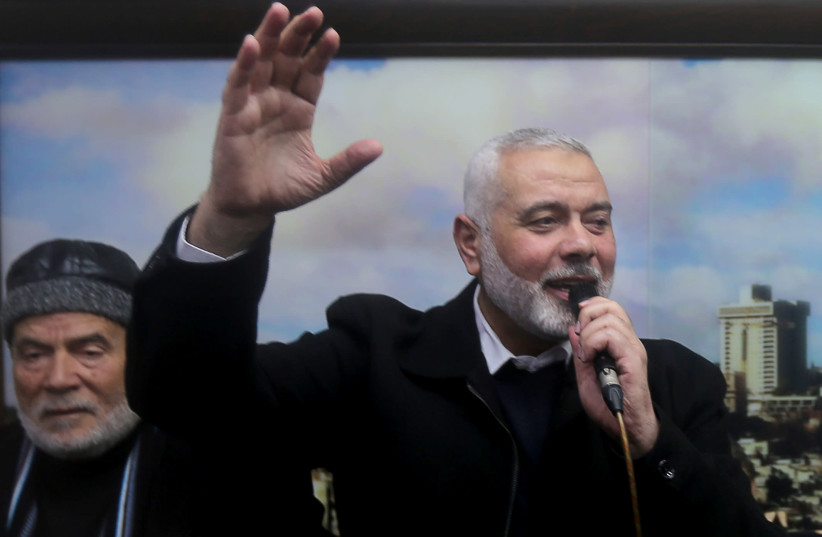A meeting of leaders of several Palestinian factions ended on Sunday in Egypt without agreement on achieving “national unity.”
The conference, which lasted for four hours, ended without a joint communique by the participants, a move reflecting the failure of the factions to reach an agreement on the formation of a Palestinian unity government and ending the feud between Palestinian Authority President Mahmoud Abbas’s ruling Fatah faction and Hamas.
“We can’t solve all our differences in one day,” said a PA official. “That’s why there wasn’t a joint statement. There will be more meetings in the near future.”
Instead of a joint communique, Abbas read out a statement at the end of the meeting in which he called for the formation of a committee that would “continue dialogue [between the factions] to achieve national unity.”
Ways of achieving national Palestinian unity
Earlier this month, Abbas invited the leaders of all Palestinian factions to a conference in Egypt to discuss ways of achieving national unity and ending the split between the West Bank and Gaza Strip. The invitation was issued during an emergency meeting of the Palestinian leadership in Ramallah to discuss the recent Israeli military operation in the Jenin refugee camp.

Abbas was hoping to use the conference to persuade Hamas and other Palestinian factions to join a unity government, according to Palestinian officials. But the gap between the positions of Fatah and Hamas was mirrored in the speeches delivered at Sunday’s conference by Abbas and Hamas leader Ismail Haniyeh.
While Abbas called for endorsing a “peaceful popular resistance” against Israel, Haniyeh insisted that his group supports a “comprehensive resistance” that would also include armed struggle.
Addressing the conference, Abbas said: “We have practiced different forms of struggle at different stages, and we see today that peaceful popular resistance, at this stage, is the best way to continue our struggle and achieve our national goals. Our choice of this method of national struggle is not a random choice, but rather a thoughtful one based on historical data and experiences.”
Abbas urged the faction leaders to “agree on this form of resistance to confront the aggression of the occupiers.”
In an indirect criticism of Hamas, Abbas denounced the “coup” the Islamist movement staged in taking over the Gaza Strip from the PA in 2007 as a “catastrophe.”
“The coup that took place in 2007, and the abhorrent division it inflicted on us, our cause, and our people, is a new catastrophe, and it must be ended immediately and without any hesitation or delay,” Abbas said. “We must work to end the division and restore matters to their proper place, within the framework of one state, one system, one law, one legitimate weapon, and one government.”
The Palestinian Authority's demands and Hamas, PLO's rejection
The PA president repeated his demand that Hamas and other Palestinian factions recognize the PLO as the sole and legitimate representative of the Palestinian people, and adhere to the organization’s political program and all its international obligations.
Hamas has rejected this demand for fear that it would be interpreted as recognition of Israel and the agreements signed between the Israelis and Palestinians, especially the 1993 Oslo Accord.
“I invited you to this meeting to study ways of achieving our national unity, strengthening the steadfastness of our people, repelling the continuous [Israeli] aggression against us, and protecting our homeland, our people, and our sanctities,” Abbas said, adding that he was prepared to hold long overdue general elections provided that the Arab residents of east Jerusalem can participate in the vote.
In 2021, Abbas called off parliamentary and presidential elections that were slated to take place that year, citing Israel’s refusal to allow the vote to take place in east Jerusalem. Abbas’s critics, however, said he used the Jerusalem issue as an excuse to avoid elections, because of his fear that his Fatah faction, which was running under three separate lists, would lose to Hamas.
Haniyeh, the Hamas leader, called at the conference for “endorsing the option of comprehensive resistance [against Israel] and strengthening the steadfastness of the Palestinians and their struggle, against the crimes of the occupation and settlers in the West Bank and Jerusalem.”
Hanieyh said that despite the challenges facing the Palestinians, they nevertheless “have a window of opportunity that must be exploited: the unprecedented internal division [over the judicial overhaul] and strained international relations (a reference to the crisis between the Biden administration and the Israeli government).”
The Hamas leader said that the “achievements” scored by the Palestinians during the 2021 war in the Gaza Strip and the recent military operation in the Jenin refugee camp “make us all face a great responsibility, and [realize] that the only option is to develop and support this heroic resistance and uprising so that we can achieve our goals of ending the occupation, uprooting settlements, and imposing our sovereignty on all the historical land of Palestine.”
Haniyeh repeated his call for ending “all forms of security coordination with the occupation.” He also called for an end to the PA security crackdown on Hamas and Palestinian Islamic Jihad members in the West Bank.
Three factions – Palestinian Islamic Jihad, Popular Front for the Liberation of Palestine-General Command, and As-Sa’iqa – boycotted Sunday’s conference in protest of the ongoing PA security crackdown on Palestinian terrorists in the West Bank.
